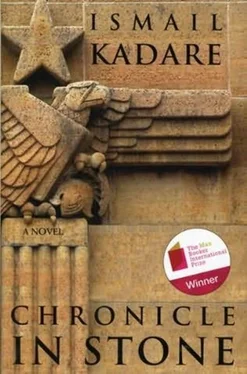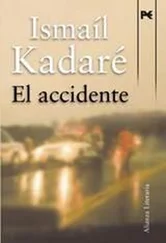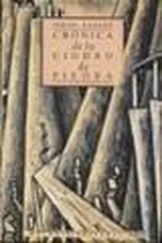Ismaíl Kadaré - Chronicle in Stone
Здесь есть возможность читать онлайн «Ismaíl Kadaré - Chronicle in Stone» весь текст электронной книги совершенно бесплатно (целиком полную версию без сокращений). В некоторых случаях можно слушать аудио, скачать через торрент в формате fb2 и присутствует краткое содержание. Жанр: Современная проза, на английском языке. Описание произведения, (предисловие) а так же отзывы посетителей доступны на портале библиотеки ЛибКат.
- Название:Chronicle in Stone
- Автор:
- Жанр:
- Год:неизвестен
- ISBN:нет данных
- Рейтинг книги:4 / 5. Голосов: 1
-
Избранное:Добавить в избранное
- Отзывы:
-
Ваша оценка:
- 80
- 1
- 2
- 3
- 4
- 5
Chronicle in Stone: краткое содержание, описание и аннотация
Предлагаем к чтению аннотацию, описание, краткое содержание или предисловие (зависит от того, что написал сам автор книги «Chronicle in Stone»). Если вы не нашли необходимую информацию о книге — напишите в комментариях, мы постараемся отыскать её.
Chronicle in Stone — читать онлайн бесплатно полную книгу (весь текст) целиком
Ниже представлен текст книги, разбитый по страницам. Система сохранения места последней прочитанной страницы, позволяет с удобством читать онлайн бесплатно книгу «Chronicle in Stone», без необходимости каждый раз заново искать на чём Вы остановились. Поставьте закладку, и сможете в любой момент перейти на страницу, на которой закончили чтение.
Интервал:
Закладка:
Snow covered everything. It was cold. The chimneys smoked steadily. Beneath the heavy roofs, life, disrupted by recent events, settled down again. The Angoni vs Karllashi trial resumed. Llukan the Jailbird, with his blanket over his shoulder and his bread wrapped in a kerchief, crossed the neighbourhood on his way to the prison, greeting passers-by right and left. Lame Kareco Spiri also seemed at ease again. Kako Pino was summoned to a wedding in Dunavat; Nazo’s cat disappeared.
Life seemed to be back to normal. The nuns looked even blacker against the snow. The searchlight beamed with new lustre. Only the aerodrome remained deserted. It was utterly empty now. Not even cows. Just snow. I was getting ready to turn the crusaders loose (who would mix with the refugees), and the lame man too. But that very day, just when life seemed to be settling back into its old routine, the bombing started again.
The cellar, which had been abandoned for a while, was now full again. It was warm there in winter.
“Here we are again, flocking like chicks around a hen,” said the women, greeting one another as they energetically, almost joyfully, unrolled their blankets and mattresses. They were all there: Kako Pino, Bido Sherifi’s wife, Ilir’s mother, Lady Majnur (still holding her nose), Nazo and her pretty daughter-in-law. Only Xhexho, who had disappeared once again, was missing. Çeço Kaili still wouldn’t come. Aqif Kashahu now sent only his sons, at whom Bido Sherifi stared in terror, God knows why. Aqif himself, his deaf mother, his wife and his daughter stayed home.
The snow muffled the rumble of the planes and the roar of artillery. The sound of the old anti-aircraft gun was still different from the others. But by now no one expected it to do any good. It was like an old blind man teased by kids, who responds by throwing stones that never hit their mark.
The English planes paid us regular visits every day. They would loom in the sky almost to a schedule, and people seemed to get used to the bombings as a disagreeable part of a daily routine. “See you tomorrow at the coffee house, right after the bombing.” “I’ll be up at dawn tomorrow; that way I think I’ll have the house cleaned before the bombing.” “Come on, let’s go down to the cellar, it’s almost time.”
But no one suspected that the cellar’s days were numbered. That its time had passed .
That judgment was uttered by a man who came down the stairs wearing a black cape over his shoulders.
“Who’s that?”
“What does that man want?”
“Make way for your visitor. He’s a foreign engineer. He wants to check the shelter.”
“An engineer?”
The interpreter threaded a path through the blankets and mattresses where the sick people and pregnant women were lying. The foreigner in the black cape followed. He asked for a chair.
“Good God, where did that man come from?”
“Don’t look at him like that.”
“What’s he going to do with that knife? Lord have mercy!”
The man in the black cape stood on the chair they had brought him. He took out of his tool-bag a knife with a finer point and a sturdy hammer. He gave his bag to the interpreter, then raised his right arm and hit the ceiling with the hammer in several places. Then he handed the hammer to the interpreter, and took one of the knives. His arm shot up and with a jab, almost taking it by surprise, he dug the knife into the ceiling. We all held our breath. The man pulled the knife out slowly. Bits of rubble fell to the floor with a clatter. The tip of the knife had turned slightly white. He got down from the chair, moved a little further over, got up again, and did the same thing again, this time with both knives. Now both blades were white with plaster. The foreign engineer got down off the chair and said a few words to the interpreter.
In a loud, mechanical voice, the interpreter translated, “This cellar is unsuitable for use as a shelter. Whose house is this?”
My father came forward.
“Your cellar is inadequate as a shelter,” he repeated to my father with the same indifference, looking past him at the wall as if he was reading off it.
My father shrugged.
The foreigner said something else.
“The engineer says the cellar has to be evacuated immediately. It would be dangerous to stay here.”
No one said a word. The engineer’s knives had slashed not only the walls but everyone’s flesh too; you could tell by the painful way their wrinkles tightened and contracted.
The man in the black cape strode towards the exit. His cape billowed out behind him as he went up the steps, cutting off for a moment the feeble light that streamed in from outside, then letting it in again.
“My God,” said a neighbour of ours who suffered from rheumatism. “Where are we supposed to go now?”
Some of the women began to wail.
“Where are they going to put us now?”
“Enough,” Bido Sherifi cried. “We’ll find another shelter somewhere. Stop crying.”
“It’s not the end of the world.”
“We’ll find a place. There has to be another place.”
“They say they’re going to open the citadel to the public.”
“The citadel?”
“Why not? It’s possible. Come on, let’s get the blankets together,” Bido Sherifi said to his wife.
One by one people started to go. The cellar was emptying. By afternoon the last to leave, the sick and the pregnant women, were gone. The door creaked in complaint. We were left alone.
All was silence. I went upstairs. You could hear worms gnawing at the wood. So quiet you could hear a worm munching… I listened for a long time to a monotonous crackling whose source I couldn’t locate. The time of the worms has come, I thought.
I went downstairs. There was no one in the hallway. The lamp was there, and the candle too, its black wick bowing its head sadly. I lit it and, holding it gingerly, started down the stairs to the cellar. I could feel the smell of people drifting up. The candle’s flickering light swept over the white walls. On the ceiling I could see the small wounds left by the knife of the man in the black cape.
The engineer in black was all we talked about during that time. He showed up everywhere, and everywhere he declared cellars unsuitable as shelters. Just as he had done at our place, he would start by asking for a chair and then, with a quick, almost sly thrust of his arm, he would stab old cellars to death. One hundred and sixty-three cellars large and small were cleared out in just four days. On the fifth day, before heading back to Tirana, the engineer got roaring drunk on the local raki and, getting into his car, said that he was sorry to be leaving behind a city doomed to destruction but that it wasn’t his fault, he had done all he could, the days of his visit had been terribly painful for him too, but in the end no one could fight fate. There comes a time, he said, when not only cities but even kingdoms and empires must perish.
As if to bear out the engineer’s words, the English bombing suddenly intensified. Forty-nine people were killed in four days. In the town hall the council met in continuous session to decide whether to open the citadel to the public. They had been deliberating for three days when the inhabitants of Lower Dunavat breached the citadel’s western gate without waiting for the council’s decision. On the same day the people of the market district forced the eastern gate.
That day, from morning to evening, there was a long migration to the citadel.
Doors slammed shut in our street all night.
“You going too?”
“Yes. Are you?”
“We’ll decide later this evening.”
“There may not be enough room for everyone.”
“I think it’ll be all right. The cellars under the citadel are huge.”
Читать дальшеИнтервал:
Закладка:
Похожие книги на «Chronicle in Stone»
Представляем Вашему вниманию похожие книги на «Chronicle in Stone» списком для выбора. Мы отобрали схожую по названию и смыслу литературу в надежде предоставить читателям больше вариантов отыскать новые, интересные, ещё непрочитанные произведения.
Обсуждение, отзывы о книге «Chronicle in Stone» и просто собственные мнения читателей. Оставьте ваши комментарии, напишите, что Вы думаете о произведении, его смысле или главных героях. Укажите что конкретно понравилось, а что нет, и почему Вы так считаете.












